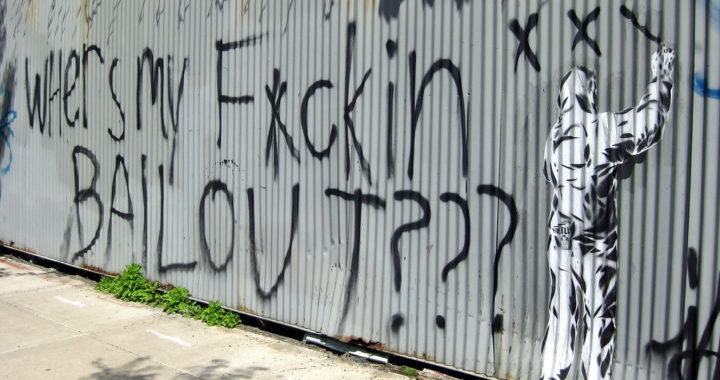‘This Is Unacceptable’: Trump Administration Says Millions May Have to Wait 5 Months to Receive $1,200 Relief Check
“That’s not even remotely fast enough for the millions of working people who have seen their hours slashed, their expenses rise, and their government refuse to take sufficient action.”
By Jake Johnson
More than 10 million Americans lost their jobs last month and are in desperate need of immediate financial assistance amid the coronavirus crisis, but the Trump administration said in a draft plan circulated internally Thursday that people who do not have direct deposit information on file with the IRS—a group that is disproportionately low-income—may have to wait until September to receive the one-time $1,200 payment authorized under the latest stimulus.
The IRS said in the draft plan that it intends to start sending electronic payments by late next week to those with direct deposit information on file from their 2018 or 2019 tax returns, the Washington Post reported.
“As people lose their jobs, we can’t leave them in the cold while big corporations easily access their bailout money.”
—Rep. Alexandria Ocasio-Cortez“However, $30 million in paper checks for millions of other Americans won’t start being sent out until April 24, as the government lacks their banking information,” according to the Post. “And some of those checks won’t reach people until September, the document shows, underscoring the reality that many Americans could have to wait five months to receive their checks.”
During a press briefing Thursday evening, Treasury Secretary Steve Mnuchin—who just last week dismissed surging unemployment as “not relevant”—promised that Americans without direct deposit information on file will soon be able to access a “web portal” to provide their banking details to the IRS.
Patricia McLaughlin, a Treasury Department spokesperson, told the Post that “the overwhelming majority of eligible Americans” will receive stimulus payments within the next three weeks, but progressive lawmakers and advocates are warning that millions of vulnerable people—including those living on Supplemental Security Income (SSI) and veteran pensions—could fall through the cracks.
“This is unacceptable,” Rep. Alexandria Ocasio-Cortez said of the possible five-month delay in an email to supporters late Thursday. “That not even remotely fast enough for the millions of working people who have seen their hours slashed, their expenses rise, and their government refuse to take sufficient action.”
“This lockdown could last for months,” said Ocasio-Cortez. “As people lose their jobs, we can’t leave them in the cold while big corporations easily access their bailout money.”
Others similarly raised alarm about the IRS’ estimated timeline, which experts warn could be derailed by technical glitches.
“This is such a stupid disaster. We did not have to have mass unemployment,” tweeted New York Times columnist Farhad Manjoo. “The policy response could have been to have the government pay companies’ payroll, like European countries are doing. Instead we’re letting people lose their jobs and sending them too-small checks too late.”
people are gonna get evicted waiting for these checks
people are going to die waiting for these checks https://t.co/Li8jR9ECZz
— Kelsey D. Atherton (@AthertonKD) April 2, 2020
The Washington Post reported that the IRS draft plan “would distribute paper checks to the lowest-income Americans first, prioritizing payments for individual taxpayers with incomes of $10,000 or less on April 24.”
“Checks for earners of $20,000 or less would be in the mail May 1, followed by those with incomes of $30,000 on May 8, $40,000 on May 15, and continuing in income increments of $10,000 each week,” according to the Post. “The IRS plans to issue about 5 million checks each week.”
Late Wednesday, the Trump administration reversed policy guidance that would have required millions of Social Security recipients to file a tax return in order to receive their payments. However, critics said the reversal needlessly leaves out many SSI recipients and veterans, potentially causing massive delays in payments.
“The president appears more interested in putting his name on the check than getting it to Americans as quickly as possible.”
—Aaron Klein, Brookings Institution“These are important members of our communities living with additional burdens in this pandemic,” Chuck Marr, senior director of federal tax policy at the Center on Budget and Policy Priorities, wrote in a blog post Thursday. “There’s no reason to add to that burden by making them navigate filing a tax return when their government has all it needs to deposit a rebate in their bank account.”
As millions of people worry about payment delays, many others—including high school seniors, college students, and immigrant families—have learned in recent days that they are not eligible for the one-time $1,200 payments, which are part of a massive stimulus package President Donald Trump signed into law last Friday.
Aaron Klein, a fellow in economics studies at the Brookings Institution, estimated Tuesday that around 70 million Americans “are likely to have to wait at least another month, or more,” to receive their stimulus payment because they didn’t owe taxes—and thus did not file a return—in 2018 or 2019, or they did not use direct deposit for their tax refund.
“Despite being the largest economy on earth we lack both government run real-time payments and universal bank accounts, systems common among developed countries,” Klein noted. “Americans shouldn’t have to wait for Congress to act. Federal bank regulators have substantial authority to fix these problems. The Federal Reserve could require all checks under $5,000 to be immediately available to consumers, a power Congress delegated in the 1980s.”
“Ultimately, where there is a will, there is a way,” Klein wrote. “The president appears more interested in putting his name on the check than getting it to Americans as quickly as possible. The response to COVID is exposing a lot of problems ignored for too long. Add our basic banking and payment systems to this growing list.”
Our work is licensed under a Creative Commons Attribution-Share Alike 3.0 License.
